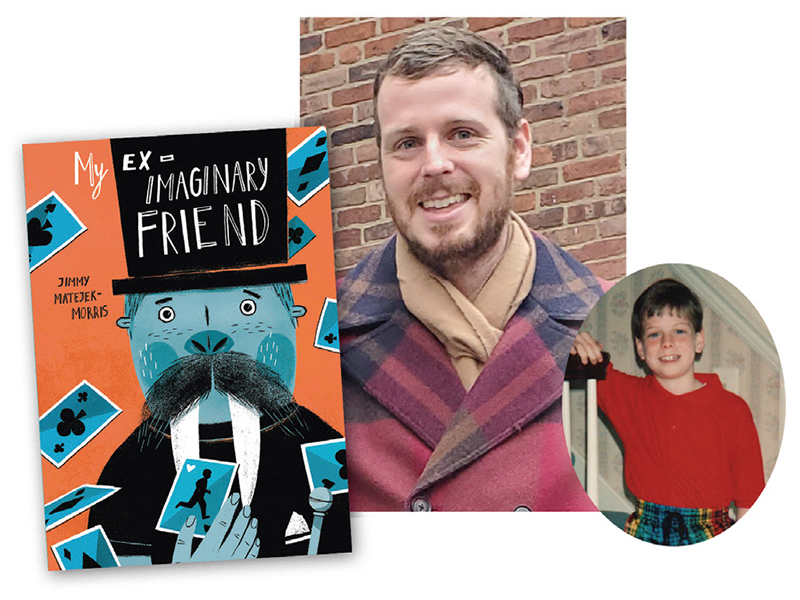Author Jimmy Matejek-Morris on Hope, Humor, and Bipolar Disorder | Middle Grade & Mental Health
The author of My Ex-Imaginary Friend says that bookending funny chapters with ones including hard conversations "helped to show that even when things are tough, there is hope and humor on the other side."

Jimmy Matejek-Morris is the author of My Ex-Imaginary Friend, about a child who relies on an imaginary friend after his father disappears and his mother’s bipolar disorder causes family chaos. Matejek-Morris was profiled in the SLJ article "Not OK? That's OK: Middle Grade Authors Provide Compassionate Portrayals of Mental Health."
What drew you to writing about a character with mental illness?
Many children, my younger self included, are struggling or know someone who is struggling with their mental health. As someone who has benefited from therapy and medication over the years, I feel it is so important to bring these conversations out into the open and let young readers know that they are not alone. My hope is that writing about mental health and mental illness with compassion and care will lead to empathy and understanding.
What kinds of interventions, treatments, supports, and therapies take place in your book?
Like many folks who live with mental illness, Jack's mother has a difficult time finding the right balance of therapy and medication. Overwhelmed, she decides to stop her medication completely without informing her doctor or closest friends and family. As a result, when the story starts, she is experiencing a manic episode. She walks out on Jack and leaves him to wonder why. By the end of the book, she is back in therapy and is working toward finding the best treatment for her going forward.
Tell me about the effects mental health has on Jack and those around them.
In the beginning of My Ex-Imaginary Friend, Jack is unaware of his mother's bipolar disorder diagnosis. He has witnessed her depression and manic episodes firsthand, but nobody has taken the time to explain to him what is happening. These conversations are not easy, and nobody knows the words to use. Unfortunately, without the proper context, his mother's actions come across as confusing, frustrating, and even scary. Jack feels completely abandoned, alone, and angry. How dare his mother hurt him like this? It is not until his aunt finally tells Jack the truth that he begins to see his mother with a kinder lens. Understanding leads the way to empathy.
What is the most challenging part of writing about these topics for middle grade readers?
Frank conversations about mental health are so important, but can also be very heavy and overwhelming. For me, the biggest challenge was making sure a young reader would leave the book knowing that while Jack's mother's mental illness was very real and serious, it was also manageable. Both Jack and his mom were going to be okay.
How did you balance depicting the reality of living with mental illness with the important message of hope?
Humor makes difficult subjects seem more accessible to me, so Jack's part-walrus, ex-imaginary friend, George, was incredibly helpful in creating a sense of hope throughout the novel. Whenever Jack feels stressed, the eternal optimist George is there with a joke or a magic trick. Bookending the hard conversations about mental illness with amusing George chapters helped to show that even when things are tough, there is hope and humor on the other side.
What do you hope readers take away from your book?
I would like readers to walk away with a sense of empathy for those whose mental illness they may not understand. For readers who are struggling with their own mental health or who are trying to understand a friend or family member's mental illness, I hope they see that they are not alone. I see you, and I believe in you.
What do you hope to see explored more in middle grade books that deal with mental health?
I would like to see more books for a middle grade audience that include hopeful and honest depictions of mental health and its treatments.
Did you draw from any personal experiences or have connections to any of the issues explored?
A recurring theme in My Ex-Imaginary Friend is loneliness. Jack's mother doesn't feel like she can tell anyone the depth of her depression or her pause on medication. When she walks out on Jack during a manic episode, Jack similarly feels completely isolated from the world as he knew it. Even George, the ex-imaginary friend, experiences the sting of not feeling wanted anymore. As I have struggled with depression, I have felt this pain. I have been very fortunate to have access to therapy and medication, but the lingering thoughts of loneliness are not soon forgotten and have found their way into this novel and much of my writing.
Anything else you’d like to share (advice, words of support, upcoming projects that center mental health, etc)?
It is hard to speak up about mental health and mental illness. If somebody trusts you with their truth, listen. Learn. If you are struggling and need help, I hope you find the comforting ear you need, whether that is a friend, a family member, a doctor, a classmate, a co-worker, a mental health hotline. I am so proud of you for taking the first step. I truly believe in you.
RELATED
The job outlook in 2030: Librarians will be in demand
The job outlook in 2030: Librarians will be in demand
ALREADY A SUBSCRIBER? LOG IN
We are currently offering this content for free. Sign up now to activate your personal profile, where you can save articles for future viewing






Add Comment :-
Be the first reader to comment.
Comment Policy:
Comment should not be empty !!!